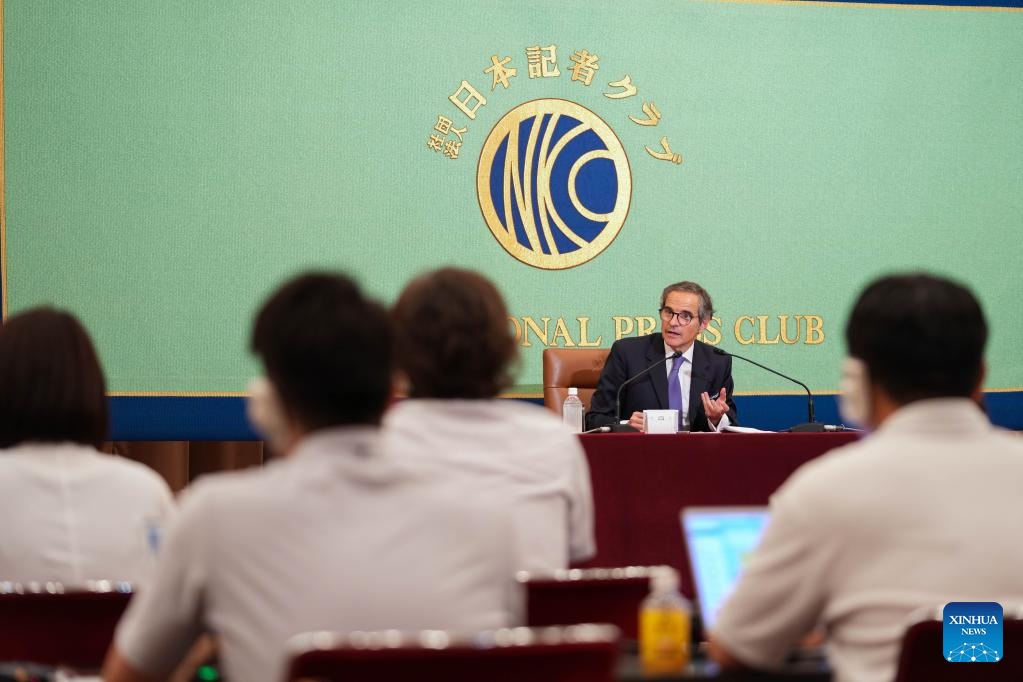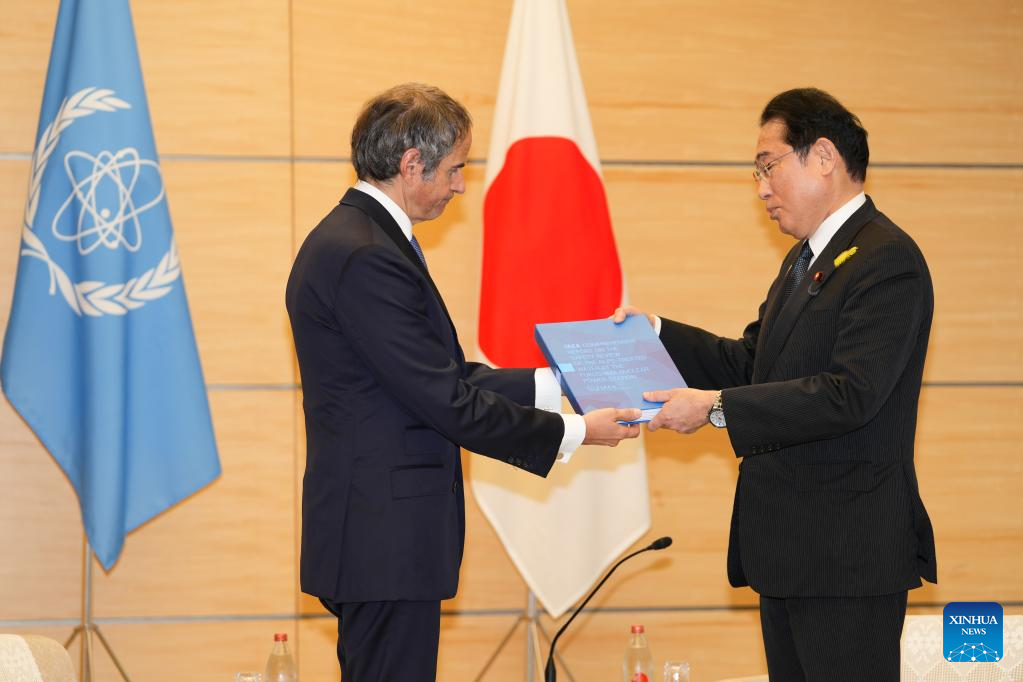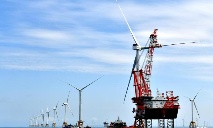Amid surging opposition to Fukushima nuke wastewater discharge plan, IAEA denies endorsement of Japanese gov't decision

The International Atomic Energy Agency (IAEA) Director General Rafael Grossi speaks at a press conference in Tokyo, Japan, July 4, 2023. (Xinhua/Zhang Xiaoyu)
TOKYO, July 4 (Xinhua) -- The International Atomic Energy Agency (IAEA) does not endorse the Japanese government's decision with its safety review report on Japan's plan to release nuclear-contaminated water from the crippled Fukushima Daiichi nuclear power plant into the sea, the report presented Tuesday here by the IAEA chief showed.
"I would like to emphasize that the release of the treated water stored at Fukushima Daiichi Power Station is a national decision by the Government of Japan and that this report is neither a recommendation nor an endorsement of that policy," the IAEA Director General Rafael Grossi noted in the foreword of the report, which he delivered in person here on Tuesday to Japanese Prime Minister Fumio Kishida.
"The views expressed herein do not necessarily reflect those of IAEA Member States," said the report, noting that "neither the IAEA nor its Member States assume any responsibility for consequences which may arise from its use."
The Japanese government has been pushing to start dumping the contaminated water this summer, which has aroused strong opposition and doubts from domestic fishing groups, neighboring countries, Pacific coastal areas, South Pacific island countries, and the overall international community.
Also on Tuesday, two South Korean media outlets said that Japan inked a "black deal" with the IAEA to "redact" the sensitive issues mentioned in its final report, citing anonymous informants.
Obtained documents supported allegations that the Japanese government provided the IAEA with at least 1 million euros to earn a draft of the IAEA final report ahead of its official delivery and demanded it be redacted in sensitive parts, The Tamsa and The Mindlenews told a joint press conference with foreign correspondents.
Chinese foreign ministry spokesperson Wang Wenbin on Tuesday told a regular press briefing that China believes that the IAEA should come to a conclusion on the ocean discharge of contaminated water from Fukushima that is responsible and can stand up to the test of history and science, and must not endorse Japan's wrongdoings in the disposal of nuclear-contaminated water.
On Tuesday afternoon, Grossi stressed at a press conference held at the Japan National Press Club in Tokyo following the IAEA report delivery that the option to discharge the nuclear wastewater into the sea is one made by the Japanese government.
The IAEA will have a continued presence at the Fukushima Daiichi plant site to review, monitor and assess the discharge activities for decades to come, Grossi said, adding that whether to allow other countries to participate in the supervision is a decision to be made by the Japanese government.
During Grossi's press conference, a group of protestors gathered outside the Japan National Press Club to voice opposition to Japan's ocean discharge plan, shouting "The sea belongs to mankind. Don't dump polluted water into the sea," and "No discharge without consent. Keep your promise to the fishermen!"
At the invitation of Japan's foreign ministry, Grossi started his four-day visit to Japan on Tuesday, including a trip to the Fukushima Daiichi nuclear power plant.

The International Atomic Energy Agency (IAEA) Director General Rafael Grossi (L) delivers safety review report on Japan's plan to release nuclear-contaminated water from the crippled Fukushima Daiichi nuclear power plant into the sea to Japanese Prime Minister Fumio Kishida in Tokyo, Japan, July 4, 2023. (Xinhua/Zhang Xiaoyu)
Photos
Related Stories
- IAEA report should not be "greenlight" for Japan's nuclear-contaminated water discharge: FM spokesperson
- S. Korea's opposition party holds rally to oppose Japan's nuclear-contaminated water discharge plan
- More Food items see price hikes in Japan in 2023 than previous year: survey
- Indonesian radioecologist concerned about Japan's plan to discharge nuclear-contaminated water into sea
- Japanese fisheries group further opposes planned release of nuke wastewater into sea
Copyright © 2023 People's Daily Online. All Rights Reserved.









